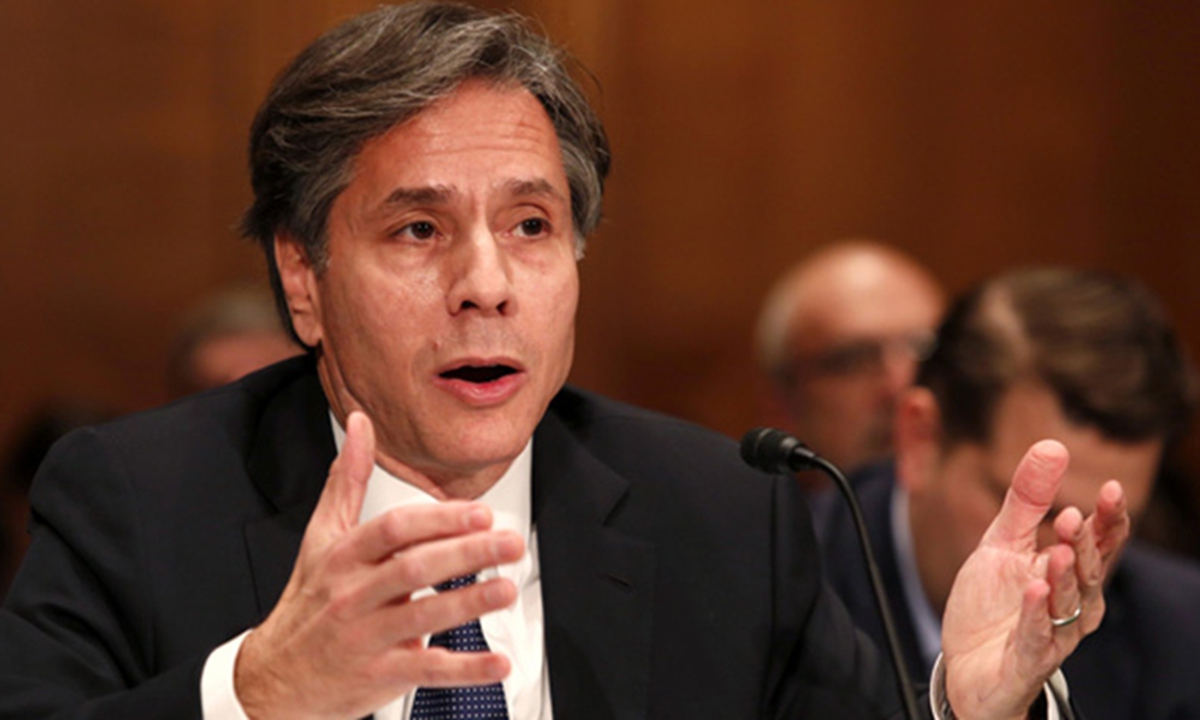New Delhi jittery about Biden administration’s strategy
Source: Global Times Published: 2020/11/25 22:37:15

File photo:Antony Blinken
Following news of US president-elect Joe Biden's choice of Antony Blinken as the secretary of state, Indian media hailed the nomination. Blinken is a long-time foreign policy expert who advocates close ties with New Delhi. In fact, certain sectors of India are elated because they think this means bad news for China.
In reality, this shows that India is very uncertain about its relations with the US when the new administration comes into office.
India has faced great challenges with its domestic and foreign affairs in recent years and openly participated in egregious actions, including devoting itself fully to the so-called Indo-Pacific Strategy, conducting the Malabar military exercise, and creating major issues with China.
New Delhi thought it could form a so-called alliance with the US. But now it has to face a new US government whose China policy may be restarted with amicable accords. This is indeed incredible pressure for India.
While Blinken showed some of his ideas about the Asia-Pacific rebalancing strategy during his term as deputy secretary of state in the Obama administration, it is groundless for India to think that India's status can get promoted in the Indo-Pacific region based on a belief that Blinken will regard India as an important part of US' new strategy in the region.
It is true that US' emphasis on India increased during the Obama years. But it only increased minimally, and produced nothing extraordinary. Apart from Obama's endorsement of India for a permanent seat on the United Nations Security Council, there is not much else to note. Although Obama's support was largely appreciated by India, it was more like a gesture of the US government that won't make any substantial difference to reality. In fact, the Americans do not like anyone to serve on the permanent seat on the UN Security Council.
By hyping up Blinken's nomination, Indian politicians and pundits only show how worried they are that US-India relations will become unstable once Biden assumes office. India is now fully betting on the US. So it will be awkward for India if it doesn't get much benefit now. India, of course, will be flexible to deal with such a situation. If US-India relations do not make enough progress as expected under Biden, then New Delhi is also likely to reverse course and re-establish better relations with China.
The US' policy toward India has been consistent over the past 20 years. Since Bill Clinton's official visit to India in 2000, India has long been regarded as a reliable partner of the US. It has also been considered as a card to restrain China. This is a consensus between both countries. So there won't be much change even after Biden takes office.
This Washington consensus is welcome in New Delhi. Still, India will try to strike a balance among multiple powers and hope not to offend anyone too much. New Delhi is aware that getting too close to Washington will potentially offend both Beijing and Moscow. That is why India kept its position in the Shanghai Cooperation Organization and yet participated in the US indo-Pacific strategy.
However, due to deteriorating China-India relations this year, New Delhi has quickly become closer to Washington. This will truly test its foreign policy. If it sees China as an enemy, then it needs a bigger backer. Whether the US will still be the key supporter remains a question that New Delhi actively thinks about. After all, India knows its influence in the global community is very limited and its contributions to the US are slight.
For a long time after the Cold War, India had no place at all in US foreign policy. For the US, India's major role today is to rival China. It will be of no importance to the US whatsoever if this role diminishes.
The article was compiled by Global Times reporter Xu Hailin based on an interview with Zhao Gancheng, director of the Center for Asia-Pacific Studies at the Shanghai Institute for International Studies. xuhailin@globaltimes.com.cn
Posted in: VIEWPOINT